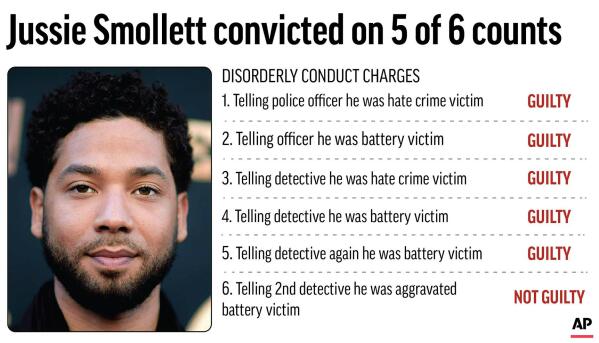CHICAGO, Ill. — Jussie Smollett’s long legal saga resumes Tuesday when an Illinois appeals court hears oral arguments on whether the former “Empire” actor’s convictions for orchestrating a racist, homophobic attack on himself in 2019 and then lying about it to Chicago police should be overturned.
If Smollett’s appeal before the First District Appellate Court in Chicago fails, he will have to serve the 150-day sentence imposed by his trial court during his 2022 sentencing. Smollett was only imprisoned for six days before being released pending the outcome of his appeal. The decision is expected to take many weeks.
Jussie’s lawyers argue in a 76-page written appeal that his 2021 trial violated his Fifth Amendment rights against double jeopardy — being punished for the same conduct twice. According to the report, he previously completed community service and forfeited a $10,000 bond as part of a 2019 agreement with the Cook County State’s Attorney’s Office to dismiss the initial allegations.
Smollett, who is Black and gay, was the victim of a racist court system and people playing politics, according to Nenye Uche, one of his lawyers, last year. Uche slammed special prosecutor Dan Webb’s plan to seek further charges in 2020. He also deemed the trial judge’s sentence for a low-level offense excessive.
In the appeal, Smollett’s legal team claims that Chief Prosecutor Kim Foxx’s office exercised legitimate discretion in dropping the original charges four years ago.
Jussie Smollett’s long legal saga resumes Tuesday when an Illinois appeals court hears oral arguments.
“If Mr. Smollett’s convictions are allowed to stand, this case will set a dangerous precedent by giving prosecutors a second bite at the apple any time there is dissatisfaction with another prosecutor’s exercise of discretion,” the appeal claims.
According to the special prosecutor’s 55-page letter, how the agreement with Foxx’s office was constructed left open the prospect of recharging Smollett without breaking double jeopardy safeguards.
“Smollett’s attacks on the validity of his prosecution are legally and factually unsupported,” it says.
Jussie stated to police in January 2019, on a bitterly cold day in Chicago, that he was the victim of a racial and homophobic attack by two individuals wearing ski masks. The pursuit of the perpetrators quickly devolved into a probe of Smollett himself, which led to his arrest on charges of masterminding the attack.
Jussie allegedly paid two individuals he knew from his work on the TV program “Empire” to arrange the attack. Prosecutors said he informed them what racist and homophobic obscenities to say, as well as that Smollett was in “MAGA Country,” a reference to Donald Trump’s presidential campaign slogan.
Jussie Smollett’s long legal saga resumes Tuesday when an Illinois appeals court hears oral arguments.
In 2021, a jury found Smollett guilty of five felony charges of disorderly conduct — the offense filed when someone lies to police. On the sixth count, he was acquitted.
Jussie was sentenced to 30 months of felony probation in 2022, with 150 days served in Cook County Jail, $120,106 in restitution to the city of Chicago and a $25,000 fine by Cook County Judge James Linn.
As he jailed Jussie, Judge Linn called him a narcissist and expressed surprise at the actor’s behavior, given his mixed family history and ties to social justice activities.
During sentencing, as Smollett was being carried to jail, he yelled that he was innocent, warning the judge that he was not suicidal and that if he died in custody, it would have been someone else’s fault.
SOURCE – (AP)











